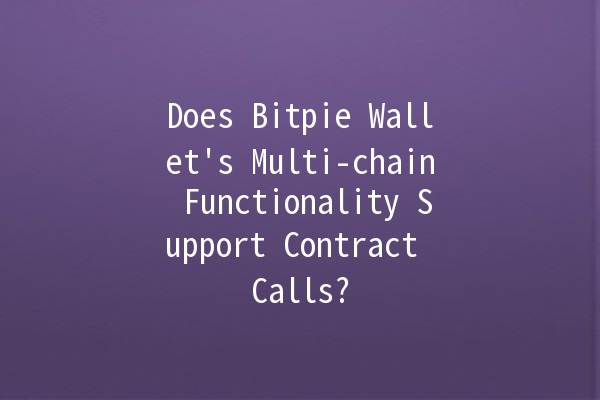




In the rapidly evolving world of cryptocurrency, wallets play a crucial role in managing digital assets. Among them, the Bitpie Wallet stands out for its innovative multichain functionality. This feature allows users to manage assets from various blockchains seamlessly. A common question arises: Does Bitpie Wallet’s multichain feature support the calling of smart contracts? In this article, we will dive deep into this query, discussing how multichain technology works, the implications of smart contract integration, and practical utilization tips for users.

Bitpie Wallet is a versatile cryptocurrency wallet that provides users with a secure platform to store, manage, and exchange digital assets across multiple blockchains. Its multichain feature enables users to interact with various cryptocurrencies without the need for multiple wallets.
Multichain technology refers to the capability of a single platform to support multiple blockchains. This approach is especially beneficial in the cryptocurrency ecosystem, where numerous projects exist, each potentially requiring different tokens and functionalities.
Smart contracts are selfexecuting contracts with the terms of the agreement directly written into code. They run on blockchain networks and facilitate, verify, or enforce the negotiation of a contract. Smart contracts eliminate the need for intermediaries and ensure trust and transparency in transactions.
Bitpie Wallet’s multichain functionality primarily focuses on allowing users to manage their assets across multiple chains. However, the support for smart contract calls is a more nuanced topic:
Decentralized ance (DeFi): Users can engage with DeFi protocols on supported blockchains by accessing smart contracts within Bitpie Wallet.
NFT Marketplaces: Holding and trading NFTs often involves smart contracts, enhancing Bitpie Wallet's utility in the digital art space.
Keep the Bitpie Wallet updated to ensure compatibility with the latest blockchain features and security patches. Regular updates also optimize interaction with smart contracts and DApps.
Example: Users should enable automatic updates within the application to avoid missing vital security patches.
Take advantage of DApps available on supported blockchains to interact with smart contracts effectively.
Example: Using Uniswap via Bitpie Wallet allows you to swap tokens without needing centralized exchanges.
Understanding the specific features of the blockchains you are dealing with will enable better utilization of smart contracts.
Example: Learn Ethereum's gas fees and how they affect transactions involving smart contracts.
Enable twofactor authentication (2FA) and other security protocols within Bitpie Wallet to safeguard your assets.
Example: Setting up biometric security options if available, enhances wallet security significantly.
Participate in community discussions and forums to learn from other users’ experiences with smart contracts and blockchain interactions.
Example: Joining Bitpie Wallet’s official forums can provide insights into common issues and innovative ways to utilize the wallet.
Yes, if you are utilizing a blockchain that supports staking through smart contracts, you can participate in staking directly via your Bitpie Wallet.
Bitpie Wallet supports a variety of blockchains including Bitcoin, Ethereum, and Binance Smart Chain, accommodating a wide array of tokens and functionalities.
Yes, transactions involving smart contracts typically incur network fees, known as gas fees, which vary based on the blockchain being utilized.
Yes, Bitpie Wallet offers a recovery phrase during initial setup that can be used to regain access to your wallet if you forget your password.
You can import an existing wallet using the recovery phrase or private key associated with the wallet. Ensure you follow the prompts correctly for a smooth transfer.
Bitpie Wallet provides customer support, accessible through their official website and inapp resources, to help with various user inquiries and issues.
Understanding the capabilities of the Bitpie Wallet, particularly its multichain functionality, opens up vast opportunities for managing cryptocurrency assets and engaging with smart contracts. While the wallet does support interactions with smart contracts on compatible blockchains, the extent of this support relies on the specific blockchain's attributes. With practical tips on maximizing the use of the wallet and common FAQs addressed, users can successfully navigate the complexities of cryptocurrency management. Embracing new technologies and staying informed are crucial for making the most of the digital currency landscape.